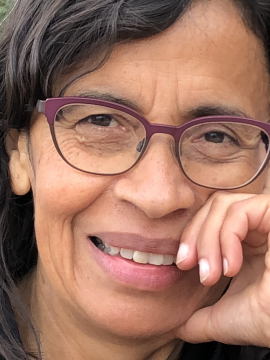Pilar Riaño-Alcalá
Research Area
About
Pilar Riaño-Alcalá is a professor at the Social Justice Institute at the University of British Columbia and co-lead of the Transformative Memory International Network. Pilar is an anthropologist and interdisciplinary scholar and an ethnographer/labourer of memory work. Her research focuses on three broad themes: a) witnessing and the lived experiences of violence in the afterlives of political violence, war and genocide, b) landscapes and practices of memory and social repairing, and c) ecologies of absence and presence in memory work. She is particularly interested in the politics of knowledge and epistemic justice, using relational methodologies that integrate different forms of emplaced and creative knowing, oral history, sound memory, and social practice art. She is a Senior Fellow at The Maria Sibylla Merian Center for Advanced Latin American Studies, CALAS (University of Guadalajara, Mexico) and a Faculty Associate in the Department of Anthropology, UBC.
Pilar has collaborated and accompanied for the last fourteen years the memory and research work of Black and Indigenous communities in the Middle Atrato and Upper Guajira of Colombia, a praxis of knowing that explores emplaced and creative research methodologies that draw on other knowledges, human and non human world making practices, and centrally locate action and change in knowledge production. She is currently working on three large research projects, Transformative Memory: An International Network (a SSHRC Partnership Grant with Erin Baines, UBC); Exhumations and Burial in Colombia and A Place of Memory (with the Committee of Victims of the Middle Atrato River) and Sacred Responsibilities to Water. Indigenous Knowledge Exchanges, Canada-Colombia (with Aimée Craft, University of Ottawa).
For over twenty years, Pilar has collaborated with public performance artist Suzanne Lacy on the public art project “The Skin of Memory” and related installations (Yerbabuena Center for the Arts and MOMA, 2019; the 8th Floor Gallery of the Shelley and Donald Rubin Foundation, New York, 2018; AD&A Museum at UC Santa Barbara, 2017; and Museo de Antioquia, Art Biennale, 2011).
As a public intellectual, Pilar has conducted extensive collaborative research and expert work in non-academic settings with various community-based organizations and initiatives of memory work (Corporación Región, Medellin, Justice and Reconciliation Project, Uganda, the Committee for the Rights of the Victims, Choco, The Collective of Communications Montes de Maria) and in the context of peace building and historical memory work in Colombia. She was appointed as a researcher of the Historical Memory Group (2008-2013), a research group comprising researchers and experts that was tasked under the Colombian Law of Peace and Justice with producing a report on the origins and causes of the armed conflict in Colombia. She was an advisor to the Museum of Historical Memory of Colombia (2015-2019) for the development of its conceptual guidelines and script.
